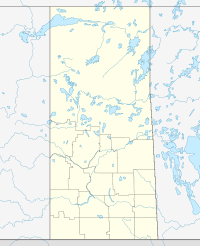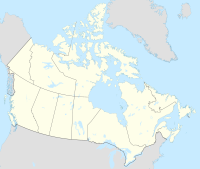Englefeld (2016 population: 285) is a village in the Canadian province of Saskatchewan within the Rural Municipality of St. Peter No. 369 and Census Division No. 15. The village is located 32 kilometres east of the City of Humboldt on Highway 5.
Englefeld | |
|---|---|
| Village of Englefeld | |
 Main Street, Englefeld | |
| Coordinates: 52°09′40″N 104°39′13″W / 52.16111°N 104.65361°W | |
| Country | |
| Province | |
| Region | Central |
| Census division | 15 |
| Rural Municipality | St. Peter No. 369 |
| Post office Founded | February 1, 1907 |
| Incorporated (Village) | June 13, 1916 |
| Government | |
| • Type | Municipal |
| • Governing body | Englefeld Village Council |
| • Mayor | Darrell Athmer |
| • Administrator | Lani Rae Best |
| Area | |
• Total | 0.65 km2 (0.25 sq mi) |
| Population (2016) | |
• Total | 285 |
| • Density | 439.3/km2 (1,138/sq mi) |
| Time zone | UTC-6 (CST) |
| Postal code | S0K 1N0 |
| Area code(s) | 306 / 639 |
| Highways | |
| Railways | Canadian National Railway |
| Website | Village of Englefeld |
| [1][2][3] | |
History
editThe community was named for Peter Engel, an abbot of Saint John's Abbey, located in Collegeville, Minnesota.[4] It is not known why Engel's name was spelled differently in the village's name.
The surrounding area was settled by German Catholic immigrants in 1902-1903 who arrived by train at Rosthern. From there travelled 125 miles by horse to the area around Englefeld. Englefeld was one of several communities within the tract known as St. Peter's Colony.[4] By 1904, the Canadian Northern Railway had made its way through the region, as did the telegraph with the telephone eventually arriving in 1916. In 1905, the first church was erected, followed by a general store and lumberyard in 1906 and a post office in February 1907. A hotel was erected in 1909 and the Englefeld school district was formed.[5] The first grain elevator in the community went up in 1910 with a railway station following in 1912. In 1910 the first fully graded roads were constructed in the community and that same year a livery barn was constructed.[6] A community hall was constructed in 1912 and electric lighting made its debut in the community in 1915.
Englefeld incorporated as a village on June 13, 1916.[7]
Demographics
editIn the 2021 Census of Population conducted by Statistics Canada, Englefeld had a population of 259 living in 105 of its 114 total private dwellings, a change of -9.1% from its 2016 population of 285. With a land area of 0.66 km2 (0.25 sq mi), it had a population density of 392.4/km2 (1,016.4/sq mi) in 2021.[10]
In the 2016 Census of Population, the Village of Englefeld recorded a population of 285 living in 107 of its 117 total private dwellings, a 13.3% change from its 2011 population of 247. With a land area of 0.65 km2 (0.25 sq mi), it had a population density of 438.5/km2 (1,135.6/sq mi) in 2016.[11]
Economy
edit- Koenders Mfg Archived 2016-03-03 at the Wayback Machine
- Schulte Industries
Arts and culture
editHog Fest - The Englefeld Hog Fest was originally organized by Father Florian Renneberg in 1972.[12] The 40th annual fundraising event brought in 1270 people over July long weekend (July 1–3, 2011) which included Canada day fireworks, carnival/farmers market festivities, culminating in a feast with 16 smoked pigs, and closing out with a pancake breakfast.[12] As part of the 25th Hog Fest (celebrated in 1996) a 7 ft tall (17 ft long) fiberglass pig was erected on top of the Koenders Manufacturing building located in Englefeld along Highway 5.
Englefeld Gallery
-
Welcome sign outside of Englefeld
-
Hogfest in Englefeld
-
Three Little Pigs' House in Englefeld
-
Downtown Englefeld
See also
editReferences
edit- ^ National Archives, Archivia Net, Post Offices and Postmasters, archived from the original on 2006-10-06
- ^ Canadian Textiles Institute. (2005), CTI Determine your provincial constituency, archived from the original on 2007-09-11
- ^ Commissioner of Canada Elections, Chief Electoral Officer of Canada (2005), Elections Canada On-line, archived from the original on 2007-04-21
- ^ a b McLennan, David (2008), Our Town: Saskatchewan Communities from Abbey to Zenon Park, Regina, Saskatchewan: Canadian Plains Research Center, University of Regina, pp. 115–116, ISBN 978-0-88977-209-0, archived from the original on 2010-04-10
- ^ "History". www.englefeld.ca. Retrieved 2019-08-01.
- ^ "Englefeld history book" (PDF).
- ^ "Urban Municipality Incorporations". Saskatchewan Ministry of Government Relations. Archived from the original on October 15, 2014. Retrieved June 1, 2020.
- ^ "Saskatchewan Census Population" (PDF). Saskatchewan Bureau of Statistics. Archived from the original (PDF) on September 24, 2015. Retrieved May 31, 2020.
- ^ "Saskatchewan Census Population". Saskatchewan Bureau of Statistics. Retrieved May 31, 2020.
- ^ "Population and dwelling counts: Canada, provinces and territories, census divisions and census subdivisions (municipalities), Saskatchewan". Statistics Canada. February 9, 2022. Retrieved April 1, 2022.
- ^ "Population and dwelling counts, for Canada, provinces and territories, and census subdivisions (municipalities), 2016 and 2011 censuses – 100% data (Saskatchewan)". Statistics Canada. February 8, 2017. Retrieved May 30, 2020.
- ^ a b Solomon, Keith. "40th annual Hogfest exceeds all expectations". Local News. Humboldt Journal. Archived from the original on 3 April 2012. Retrieved 16 October 2011.

